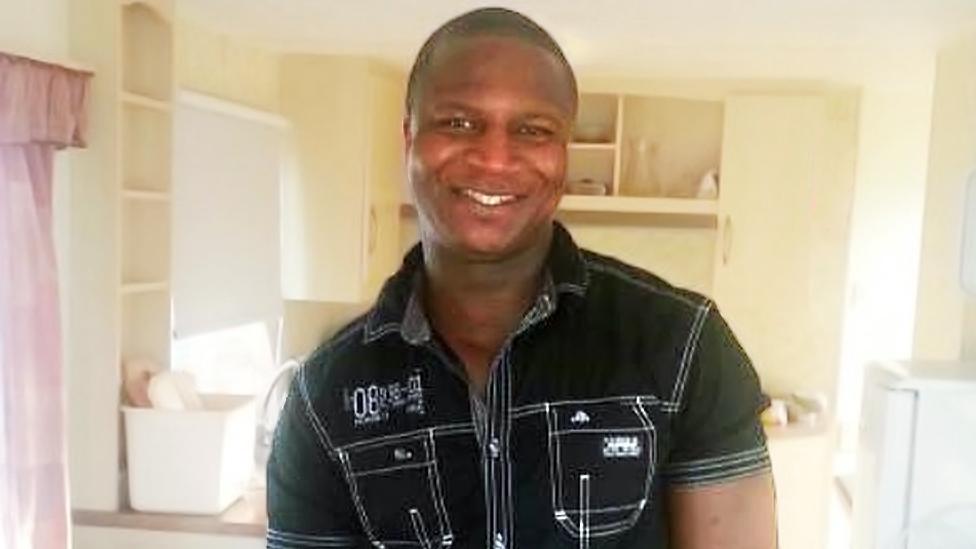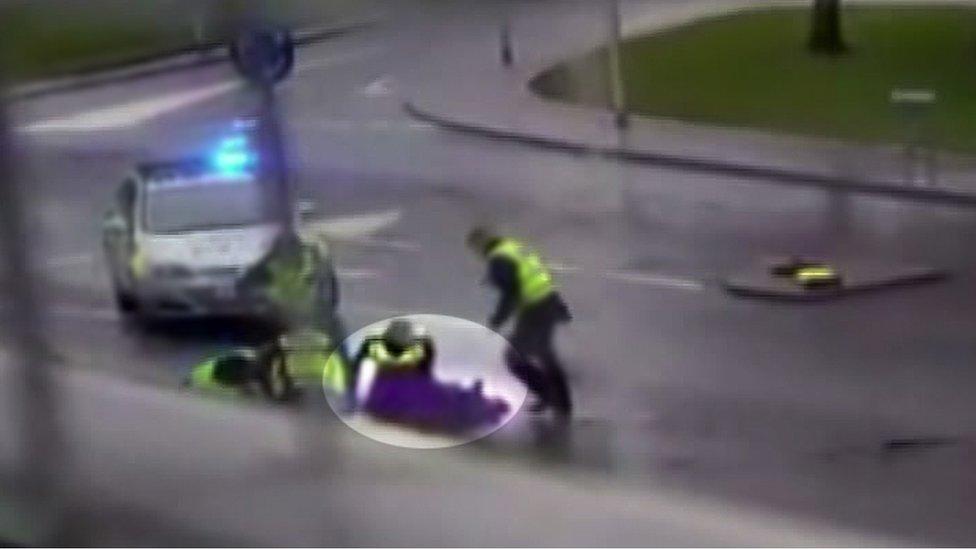Doctors found no evidence Sheku Bayoh PC was stamped on
- Published

Sheku Bayoh died after being restrained by officers in Kirkcaldy in May 2015
A police officer who is alleged to have been stamped on by Sheku Bayoh showed no signs of serious injury in the hours after the incident, according to two doctors who examined her.
The public inquiry into the 31-year-old's death has heard two police officers claim Mr Bayoh stamped on PC Nicole Short after striking her on the head.
Their account is disputed by a member of the public who watched the incident from his house.
He said the stamping did not happen.
Mr Bayoh was restrained by the police on the ground. He stopped breathing minutes later and died in Victoria Hospital in Kirkcaldy.
PC Short was taken to the hospital's accident and emergency unit immediately after the incident and was examined by A&E specialist Dr Katherine Mitchell.
Her medical notes record that PC Short told her she had been chased by a member of the public and sustained blows to the back of the head.
The notes said PC Short had a headache but no obvious injury to her chest, no chest pain, no obvious abdominal injury and no abdominal pain.
Dr Mitchell said there was nothing to indicate that PC Short had lost consciousness during the incident.
She noted PC Short's Glasgow Coma Scale (GCS) score - a method used for assessing the level of consciousness - as 15/15 at the time of being examined, which she clarified by saying it means a patient is alert and oriented, their eyes are open, their speech is not confused and they are able to follow instructions.

Mobile phone image of police restraining Sheku Bayoh
Dr Mitchell said: "She was able to describe what had happened prior to the event, the fact she had been chased and that she remembered the fall itself, and she remembered putting her arms out to save herself and then that she curled up in a ball and was then lifted by one of her colleagues.
"If she had been hazy in her recollection, it's likely I would have written that down.
"If there was a bit that she couldn't remember, that would have been clinically significant so it's likely I would have written it down."
Dr Mitchell's notes displayed at the inquiry said PC Short showed no sign of cranial nerve deficits, no double vision, no blood in the ears and no c-spine tenderness.
PC Short was given advice about head injuries and discharged.
When she gave evidence to the inquiry, PC Short said she remembered suffering "an almighty blow" to the back of her head as she was chased by Mr Bayoh. She said fellow officers later told her she had lost consciousness and been stamped on, but she had no memory of that happening.
The inquiry heard that PC Short was examined that afternoon at Kirkcaldy Police Station by a forensic medical examiner, Dr Gillian Norrie.
In her notes from the time, Dr Norrie recorded that she was told PC Short had been hit on the head with fists, fallen to the ground, then her back was stamped on.
'No concern'
Dr Norrie said she believed it was PC Short herself who said she had been stamped on.
Senior counsel to the inquiry, Angela Grahame QC, put it to the witness that "there was no note of injury to her back, so does that mean you didn't see or find an injury to her back?"
Dr Norrie replied: "Yes."
Ms Grahame then asked: "Had you found any injury, bruising, marks, discomfort, tenderness, is that something you would have noted?"
Dr Norrie replied: "Yes."
She said there were no obvious injuries at the time she saw PC Short, but told the inquiry: "That's not to say she couldn't go on to develop bruises. I didn't have clinical concern at the time, but things can evolve."
Ms Grahame asked Dr Norrie that if she had any concerns about PC Short's health, would she have sent her back to A&E. The witness replied: "Absolutely."
When asked about the officer's neurological status at the time of examination, Dr Norrie said: "If she was presenting after being hit in the head in a way that gave concern behaviourally, if she was irritable or inappropriate, drowsy, things like that would obviously prompt me more to look at the GCS. But her GCS was 15/15, so there was no concern about her neurological status."
The inquiry, before Lord Bracadale, continues.